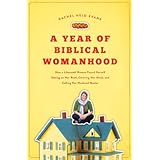 I heard Rachel Held Evans on the Q last week talking about her recent book, A Year of Biblical Womanhood. I was very interested in her from the moment she answered the first question. The concept seemed so perfect, and so perfectly in tune with where my thoughts have been the past three or four years. I listened to the whole interview while I did the dishes and Cressida played with Chritmas themed foamies in the kitchen. And I bought the book immediately after the interview, not because of the concept, but because Jian Ghomeshi asked her, “Why not throw the whole thing out and just take the parts that inspire you? Why remain a Christian?” and she answered, “Because I am drawn to the story of Jesus Christ who is the fulfillment of the Old Testament, and he said the all of the Law hinges on these: Love the Lord God with all your mind, soul and strength, and love you neighbor as yourself… So I need to read these texts with the prejudice of love and wrestle with the parts I don’t understand.”
I heard Rachel Held Evans on the Q last week talking about her recent book, A Year of Biblical Womanhood. I was very interested in her from the moment she answered the first question. The concept seemed so perfect, and so perfectly in tune with where my thoughts have been the past three or four years. I listened to the whole interview while I did the dishes and Cressida played with Chritmas themed foamies in the kitchen. And I bought the book immediately after the interview, not because of the concept, but because Jian Ghomeshi asked her, “Why not throw the whole thing out and just take the parts that inspire you? Why remain a Christian?” and she answered, “Because I am drawn to the story of Jesus Christ who is the fulfillment of the Old Testament, and he said the all of the Law hinges on these: Love the Lord God with all your mind, soul and strength, and love you neighbor as yourself… So I need to read these texts with the prejudice of love and wrestle with the parts I don’t understand.”
Now I don’t want to pretend that I already had Evans’ concept in my head before I read her book, but I had told my very good friend Jennifer days before I heard the interview that I always default to love when I have a problem with scripture and I fall back on forgiveness when I may have allowed too much acceptance of “sin.”  How could I not read this book when she so clearly understood what I’ve been trying to get out of my heart and into the world for quite some time?
I’ve been reading it very quickly. I am not done with it yet, so I’m not ready to share all of my thoughts on it. Though honestly, I’m growing weary of sharing my thoughts on the internet (especially controversial ones) because then everyone gets to just decide what kind of person they think I am. But I will say this, I am so glad that Evans is representing the Christian Feminist position. She is smart, likable, a good researcher, and willing to change her mind. And though I may not be ready to open up a debate forum anytime soon, I am finally willing to come right out and say, I am a Christian Feminist. I am struggling to figure out what that means. And though I struggle, I know for sure that it means I want to actively work to advocate for women no matter what they choose for their lives/families. And I want to live to see the end of the Mommy Wars. That would be a good thing, too.
But here I am… Opening up again. Maybe it is time to be brave… maybe in my next post.